Community-Law Enforcement Aligning in Response to Substance Use (CLEARS) Project
The Addictions, Drug & Alcohol Institute (ADAI) at the University of Washington was funded through the Washington State Health Care Authority to conduct a five-year project to develop regional solutions to improve interactions between law enforcement and people who use drugs.
Since 2022, ADAI has collaborated with seven sites across Washington State using a “policy codesign” process to bring together local stakeholders to develop their own solutions.
This website contains information about the policy codesign process, each region’s solution, and an evaluation report on the policy codesign process.
Learn About the Project
Chelan/Douglas County (2023-2025)
Grant County (2023-2025)
Kitsap County (2023-2025)
Clallam, Thurston, & Yakima Counties (2022-2023)
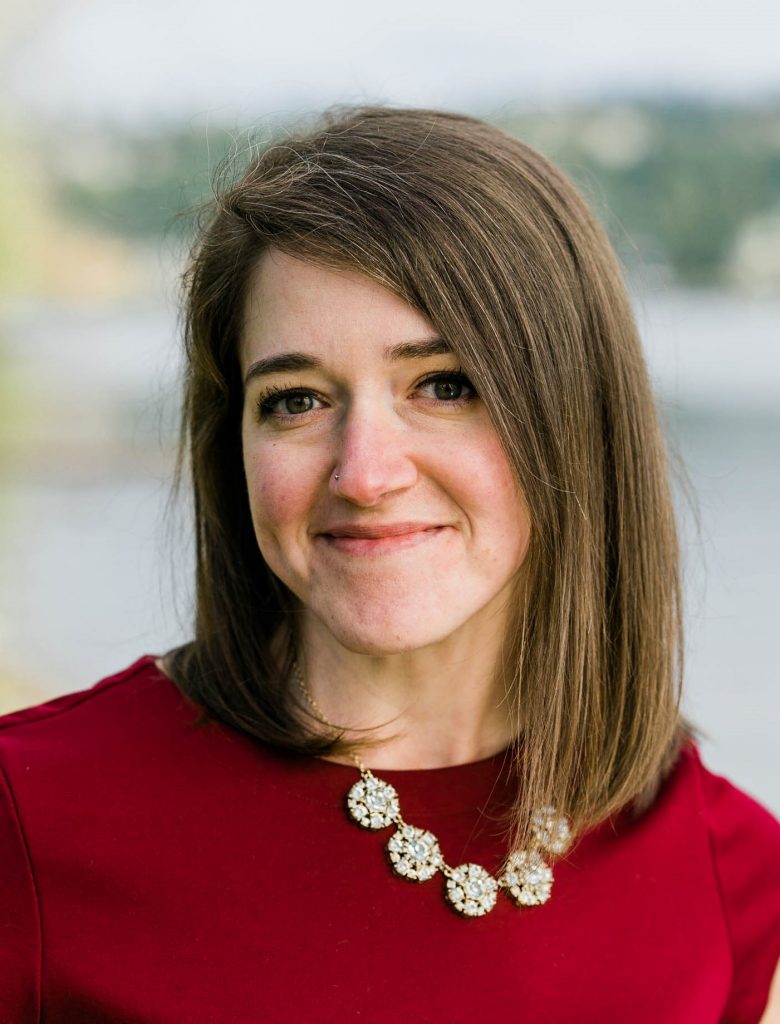
Principal Investigator: Mandy Owens, PhD (she/her)
Assistant Professor, Addictions, Drug & Alcohol Institute, Department of Psychiatry & Behavioral Sciences, UW Medicine (CEDEER)
Adjunct Assistant Professor, Department of Psychology, University of Washington
Email: mandyo@uw.edu
Mandy Owens, PhD is an Assistant Professor at the Addictions, Drug & Alcohol Institute (ADAI) and licensed clinical psychologist at the Outpatient Psychiatry Clinic in the Department of Psychiatry and Behavioral Sciences at the University of Washington School of Medicine. Her primary role is at the Center for Community-Engaged Drug Education, Epidemiology, and Research (CEDEER) within ADAI where her work focuses on the intersection between substance use and the criminal legal system. Mandy partners with people with lived and living experience of drug use, community service providers, and criminal legal partners (law enforcement, jails, prisons) to identify local solutions to crisis response for people who use drugs, implement medications for opioid use disorder programs, and conduct research and evaluation. For fun, Mandy likes to hike, travel, read, weightlift, and is trying to learn how to play golf.
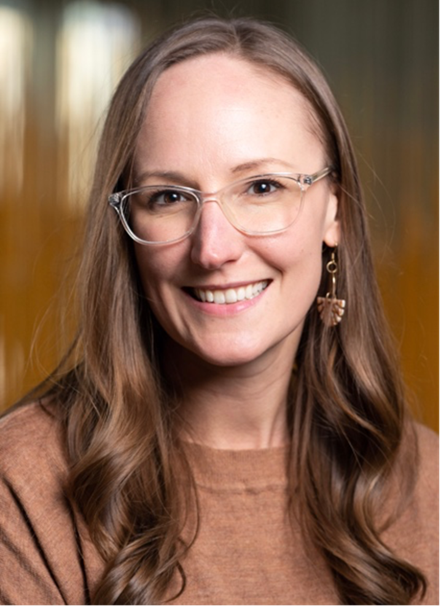
Co-Investigator: Jenna van Draanen, PhD, MPH (she/her)
Assistant Professor, Child, Family, and Population Health Nursing
Assistant Professor, Health Systems and Population Health
Email: jvandraa@uw.edu
Jenna is an interdisciplinary Assistant Professor working in the School of Nursing and the School of Public Health at the University of Washington, leading the Research with Expert Advisors on Drug Use (READU) team. She works closely with Public Health Seattle & King County and other local partners on practice-based research that centers equity for people who use drugs. In the past, Jenna has conducted evaluations as a consultant for a range of community-based organizations, local and national government agencies, and international non-governmental organizations. Her mixed-methods research and evaluation work often includes the perspectives of people with lived experience through participatory approaches. When she isn’t doing research or teaching at the UW, she is hanging out with her chickens: Joni Mitchell, Alanis Morisette, Carley Rae Jepsen, and Shania Twain or puttering around her garden. She loves board games, cooking, and crafts.
Project Coordinator: Nicole Branche (she/they)
Email: nbranche@uw.edu
Nicole Branche is a Continuing Education Coordinator at the Center for Community-Engaged Drug Education, Epidemiology and Research (CEDEER) at the University of Washington’s Addictions, Drug & Alcohol Institute (ADAI).

Lead Facilitator: Dana Pearlman (she/her)
Email: danapearlman@gmail.com
Dana Pearlman designs and facilitates diverse, multi-stakeholder engagements, and action learning experiences that lead to transformational learning and social innovation. She utilizes many methodologies, frameworks, practices, principles and systems thinking. Her academic background is in clinical psychology and strategic leadership towards sustainability.
Dana’s designed and facilitated sessions for the State of Vermont, The Ministry of Education of Tanzania, California Accountable Communities for Health, Napa County Department of Health and Human Services, Accenture Tech Vision Advisory Board, Zoomdata, Swissnex, Public Health Institute's Population Health Innovation Lab, GlobeMed, Dalai Lama Fellows, California Association of Hospitals and Health Services, Sonoma Co. Sustainability and Energy Dep., Impact HUBs SF, Stanford Leadership Experiment, CIIS, Sonoma State U's CORE Leadership, Sustainability Learning Centre, BTH in Sweden: Masters in Strategic Leadership towards Sustainability.
Dana leads intensives in The Art of Hosting Conversations that Matter and workshops in Authentic Leadership from, The Lotus: A practice guide for Authentic Leadership towards Sustainability. Dana is Advisor to the SelfDesign Institute, Curriculum Advisor to Dalai Lama Fellows, Founding Board Member for The Base Camp and mentor for HIVE Global Leaders Program. Dana is catalyzing and accelerating world-changing leadership necessary to meet the profound challenges of the 21st century.
Dana uses powerful questions to unearth wisdom at the individual, team, organizational and community and systemic levels. Her intent is to steward a world that is more whole, interconnected and in alignment with our true selves for wiser + conscious impact. Her sweet spot is at the intersection of leadership, tapping into a groups collective wisdom, and cultivating communities of practice in order to become a system of influence and transform failing systems in our world. Fun fact: Something fun you like to do! painting, pickleball, dog walks and belly laughs with friends.
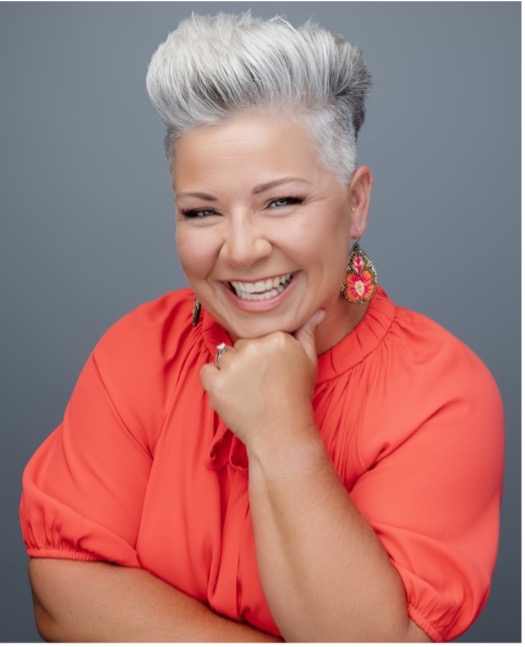
Lead Facilitator Amy Naylor
Email: amynaylor60@gmail.com
Amy Naylor is a recently retired Community Policing Lieutenant who is focused on building her public speaking and consulting business, Human Together, LLC. Amy became a police officer with the Olympia Police Department in Washington in 2000. Throughout her career she occupied a variety of positions and specialties including 5 years as a detective. With her goal to create a space of in-depth understanding, pivoting perspectives, and building relationships based on mutual trust and respect with the community, she created OPD’s first ever 8 weeks Community Academy in 2018. The program received high praise from the community as the “best community engagement” ever offered. Amy was also a significant contributor to the creation and implementation of the police department’s nationally recognized Crisis Response Unit (CRU) and Familiar Faces program.
Shortly after volunteering to oversee a new downtown Walking Patrol unit, Olympia saw a dramatic increase in visible homelessness concentrated in downtown. With the lack of alternative response options, Amy realized the power and necessity of approaching every interaction without an agenda, but with curiosity, grace, and truth (and sometimes the blue light special) when serving and working with incredibly complex and complicated humans. This work, combined with the anti-police national narrative occurring simultaneously, served as a significant pivot point in Amy’s approach to her profession, work, and life. Amy strongly believes that acknowledging people’s full humanity, prioritizing solutions that are long lasting rather than temporary, and being clear about the mission of one’s professional identity are the path to connection, belonging, resilience and safety in the community.
Amy is married to her best friend Mark and loves being “Nana” to two sweet boys. She loves reading, CrossFit, hiking, fashion, cooking, and interior design. She is also a classic introvert and craves deep conversation and solitude on the regular to refresh and refuel.
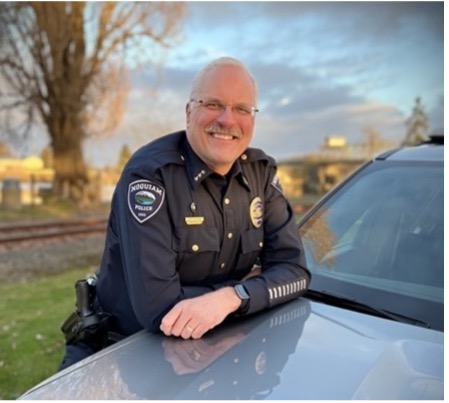
Law Enforcement Consultant: Jeff Myers
Email: jeffmyers98922@gmail.com
Jeff Myers is a retired Chief of Police who assists the project as a Law Enforcement Consultant. Jeff has 34 years of experience as a peace officer in Washington state, including the last 16 years as chief of police before retirement in 2022. Serving 13 years as a gubernatorial appointee on the Washington State Criminal Justice Training Commission with the last 10 years as chair, promoting state Accreditation for Washington law enforcement agencies for 24 years and testifying in the Legislature as a law enforcement subject matter expert on behalf of the Association of Washington Cities. He also works as a law enforcement consultant for the Department of Commerce and Office of Firearm Safety and Violence Prevention.
Jeff and his wife Monica, who is a retired firefighter/ paramedic, live in their small log cabin in the woods outside of Cle Elum surrounded by trees, turkeys, deer and a couple of feet of snow in the winter. Their youngest son Cameron serves as a patrol deputy for the Kittitas County Sheriff's Office.
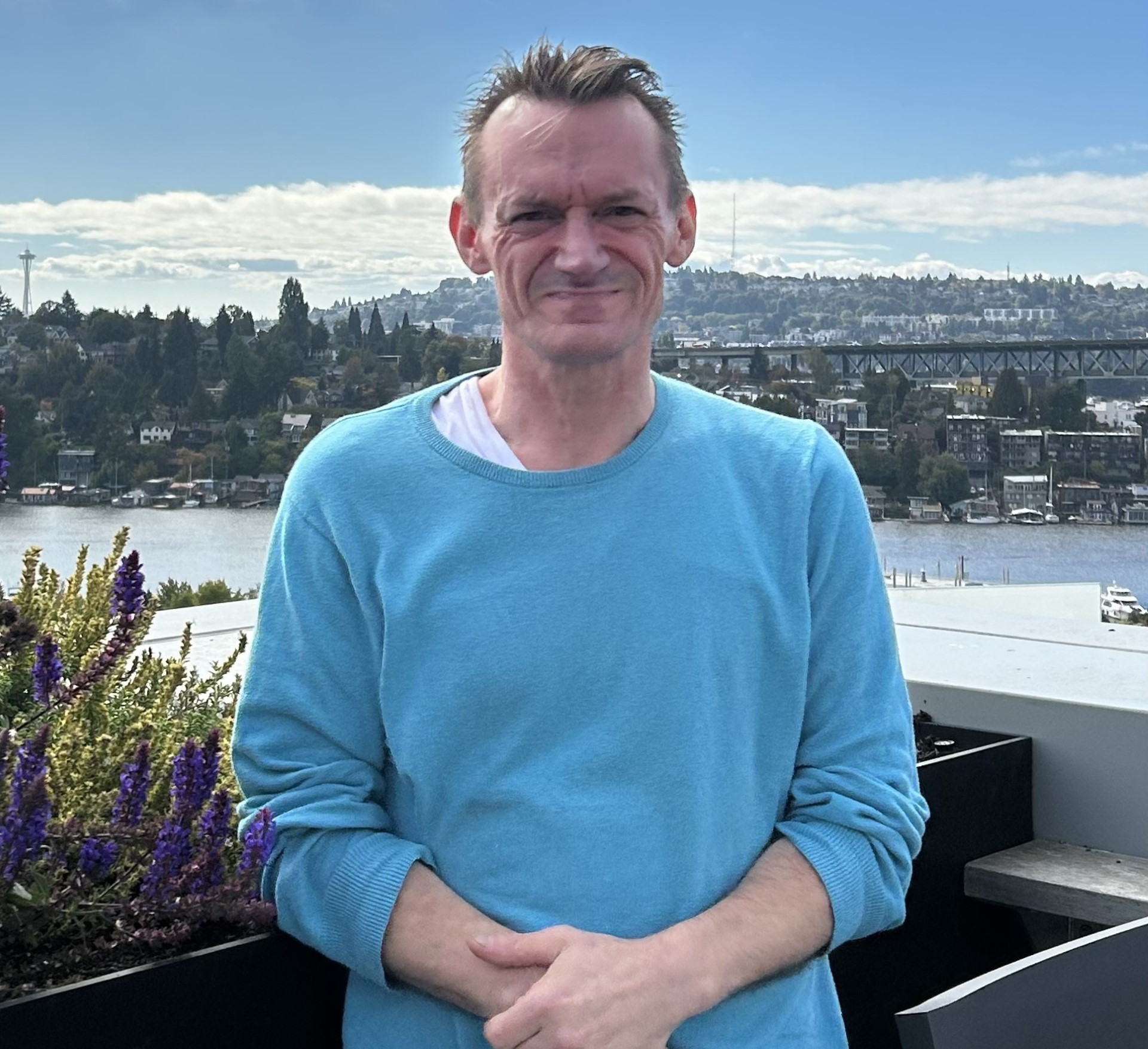
Lead READU Consultant: Robert Pitcher
Email: rpitch2@uw.edu
Robert Pitcher is a co-researcher on the Research with Expert Advisors on Drug Use (READU) Evaluation Team, working on the King County opioid settlement community consultation project, the CLEARS project, and the King County emergency medical services strategic plan. Robert is also a peer educator with King County Public Health and has volunteered at Project Neon. His work is deeply rooted in harm reduction and outreach to underserved and at-risk communities, with a focus on HIV prevention. In his free time, you can find Robert in the garden with his dogs Pinky and Toast.
Co-Lead READU Consultant: Adonica Warth (she/her)

Email: adonicawarth@gmail.com
Adonica Warth (she/her) is a co-researcher on the Research with Expert Advisors on Drug Use (READU) Evaluation Team and has been a member of the VOICE team for the past 3 years. She has many years of lived experience involving homelessness, drug use, and sex work. She is excited to share her learned knowledge with the community around her, and those affected by various public health matters, disparities, and drug use. Her understanding of the pain and loss cycles it creates has given her a heart for this community and their families and ensuring that all voices are heard. She is very excited to contribute and touch lives through the READU team.
READU Consultant: Allyn Hershey (they/he)
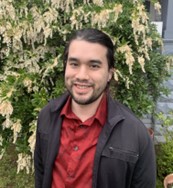
Email: allynhershey@gmail.com
Allyn is joining the team this new cycle as a co-researcher on the Research with Expert Advisors on Drug Use (READU) Evaluation Team who has lived experience of substance use to help with the evaluation process. They also participated in the project as a participant in the Thurston region between 2022-2023.
Allyn also has years of experience in harm reduction work, such as Harm Reduction Associate for King County Public Health, Director of a youth homeless shelter and outreach center, Director of Partners in Prevention Education (PiPE), and many others.
Allyn loves to spend time with their mother and dog Luna. They also love playing video games, watching and playing basketball, writing, and listening to an "unhealthy" amount of rap.
Consultant: Malika Lamont, MPA
Director, VOCAL-WA.

Former staff
Project Coordinator: Jasmine Zhu, BS
Jasmine Zhu was a Continuing Education Coordinator at the Center for Community-Engaged Drug Education, Epidemiology and Research (CEDEER) at the University of Washington’s Addictions, Drug & Alcohol Institute (ADAI). Prior to working at ADAI, Jasmine worked as a Research Assistant in several psychology labs at UW, including one looking at reactions to alcohol cues in young adults. Before starting a career in research, Jasmine worked as an elementary school teacher and an account manager in the business sector. In the future, Jasmine is interested in examining how individual’s responses to substance use and other mental health disorders differ based on situational, temporal, biological, and other factors. She is also interested in exploring how heterogeneity in predictors and timing of individual behavior can predict and identify when problems may occur, thus identifying when to provide interventions when they are most needed.
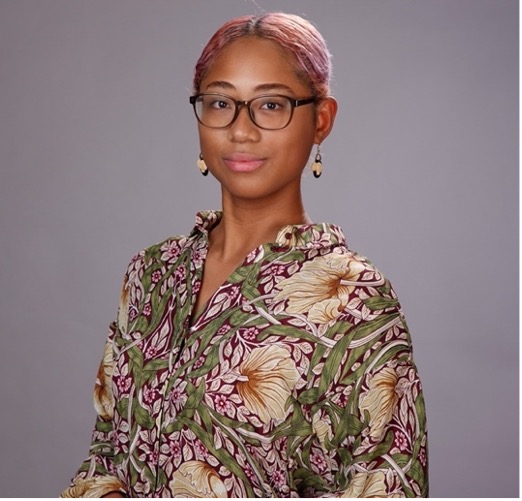
Project Coordinator: Rieanna McPhie, BA (she/they)
Rieanna McPhie was a Continuing Education Coordinator at the Center for Community-Engaged Drug Education, Epidemiology and Research (CEDEER) at the University of Washington’s Addictions, Drug & Alcohol Institute (ADAI). Prior to working at ADAI, Rieanna worked as a Research Assistant in psychology labs at John Jay College of Criminal Justice, New York University, and Indiana University-Purdue University Indianapolis. Most recently, as a Post-Baccalaureate Research Education scholar, she worked on 1) a study examining the effects of race-based stress and trauma on biological processes and physical health among Black youth and young adults, and 2) a public deliberation study looking at people’s views on youth consent for biomedical research such as HIV research. In the future, Rieanna is interested in examining the impact of sociocultural factors (racial discrimination, microaggression, acculturation, etc.) on the mental health and ethnic-racial identity of multicultural and multiracial individuals.
Research with Expert Advisors on Drug Use (READU) Evaluation Team
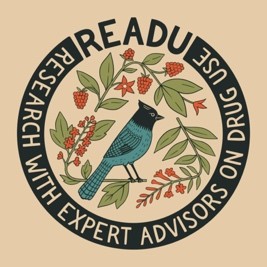
READU is based on the belief that research and change should be driven and informed by people who use drugs and serve people who use drugs. The harm reduction and organizing principle “Nothing about us without us” is central to their work. Visit the READU Website
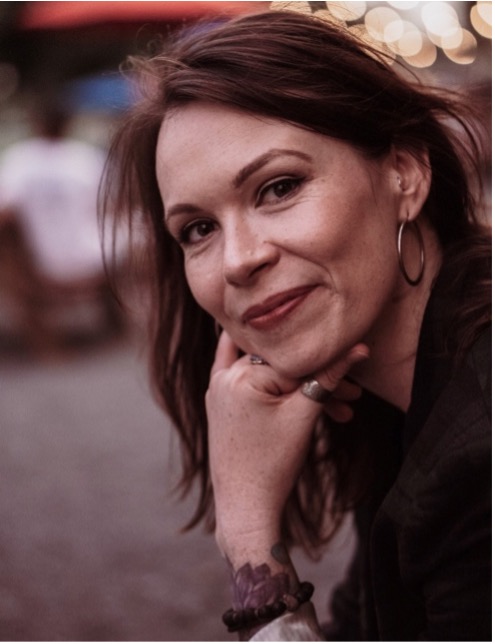
Team Member: Tessa Frohe, PhD
Email: frohe06@uw.edu
Tessa Frohe, PhD is a harm reductionist and Assistant Professor at the University of Washington where she serves as a full-time faculty member with the Harm Reduction Research and Treatment (HaRRT) Center in the Department of Psychiatry and Behavioral Sciences. Tessa has been a member of the Research with Expert Advisors on Drug Use (READU) since it formed in 2021. Her interests are informed by 10-years of substance-related research and clinical experience involving diverse topics with substance use and chronic pain, as well as her own lived experience and unfortunate loss of loved ones due to overdose related deaths. Tessa’s core values in research are to work collaboratively with people who use drugs, community members, and organizations to develop, conduct, evaluate, and disseminate evidence-based interventions that help reduce substance-related harm and improve quality of life for affected individuals and their communities. Outside of research life, Tessa enjoys hiking, doing yoga, cooking, and listening to live music.
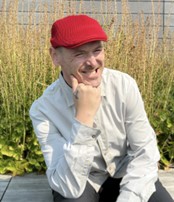
Team Member: Nathan Holland
Nathan Holland is a co-researcher on the READU team and worked on the King County opioid settlement community consultation project, the CLEARS project, and the King County emergency medical services strategic plan. Nathan is a harm reduction advocate and advocate for youth in foster care and has co-authored several papers and conference presentations on drug user health equity. Nathan has 16 years of lived experience in the foster care system and has experienced homelessness and uses his lived experience to inform his research and advocacy. Nathan seeks to continue his advocacy by serving on an advisory board of former foster care youth. He enjoys playing video games, listening to country music, and jumping in his pool on a hot summer’s day.

Team Member: Grover (Will) Williams
Grover (Will) Williams is a co-researcher on the READU team and worked on the King County opioid settlement community consultation project, the CLEARS project, and the King County emergency medical services strategic plan. Will is a long-term harm reductionist and advocate with years of experience working in the community and speaking at overdose awareness community events and UW lecture series. In addition to teaching students, Will has co-facilitated harm reduction training for clinicians at the UW Harborview Grand Rounds series in the Psychiatry and Behavioral Sciences Department and has worked with the Harm Reduction Research and Treatment (HaRRT) Center for the past 7 years and has co-authored several published manuscripts. Will is also an avid karaoke enthusiast.

Team Member: Andre Morris
Andre Morris is a member of the READU team, working on multiple projects including the CLEARS project. He strives to bring an open mind and positivity in the search by bringing his knowledge and understanding to make tomorrow a better day for us all.

In 2021, the Washington State legislature passed Senate Bill 5476 (“the Blake response”) that included a new requirement for all new law enforcement recruits to be trained in substance use and substance use disorder. The University of Washington partnered with the Washington State Criminal Justice Training Commission (WSCJTC) to develop, implement, and evaluate this new training for their Basic Law Enforcement Academy (Washington's mandated training academy for all city and county entry-level peace officers in the state). Beginning July 2022, this new training on substance use and substance use disorder was successfully implemented at the WSCJTC Basic Law Enforcement Academy. The evaluation showed improvements in knowledge of alcohol and drugs, and improved confidence to interact with people who use drugs for recruits receiving this new training.
During the development of this new substance use disorder training for law enforcement, the University of Washington conducted individual and group interviews around Washington State with more than 75 individuals, including people who use drugs, law enforcement, service providers, and other stakeholders (e.g., housing, judges, drug court). From these interviews, a clear theme discovered was the need for a regional response to improving interactions between law enforcement and people who use drugs, in addition to statewide efforts.
In response, in 2022, spear-headed by Representative Lauren Davis, the Washington State legislature funded this one-year project by the University of Washington to develop regional strategies to improve interactions between law enforcement and people who use drugs in three areas in Washington State. In 2023, this project was refunded for an additional 2 years, and we're happy to share that we've received an additional 2 years of funding to continue the work through 2025-2027.
- Develop regional solutions to improve interactions between law enforcement and people who use drugs through a policy codesign process, a process that brings together local stakeholders to build relationships, learn about their community, and brainstorm new ideas.
- Develop materials for future regions to engage in a similar codesign process and/or implement these solutions in their own communities.
- Learn how participants felt about the policy codesign process to inform potential future efforts.
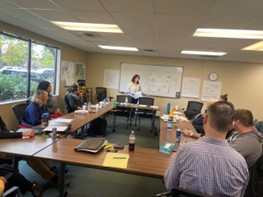
- Policy codesign brings together local stakeholders (anyone that has an interest in the outcomes of the community) to develop policies from the “ground up” to fit community needs. Policies could include both formal and informal practices, such as legislation, clinic procedures, and/or other community efforts.
- Policy codesign was previously used by project staff in Grays Harbor to develop a medication for opioid use disorder program at the Grays Harbor jail.
- Policy codesign was used as an approach for the current project given the focus on the community context. This also was based on feedback from law enforcement, people who use drugs, and other stakeholders while developing the substance use disorder training for the WSCJTC in 2021.
A series of 6 sessions in which diverse stakeholders (law enforcement, people with lived experience of drug use, service providers, etc.) came together to connect, build relationships, discuss issues in their community (Clallam County, Thurston County, & Yakima County), and cocreate pilot solutions to improve interactions between law enforcement and people who use drugs.
*LE= law enforcement, PWLE=people with lived experience of drug use
Level setting:
Two-hour meetings within stakeholder groups to discuss challenges and opportunities in the community in preparation to enter the codesign process. (LE Agenda, PWLE Agenda)
Session 1:
Completed introductions, group agreements, relationship building among participants. (Agenda)
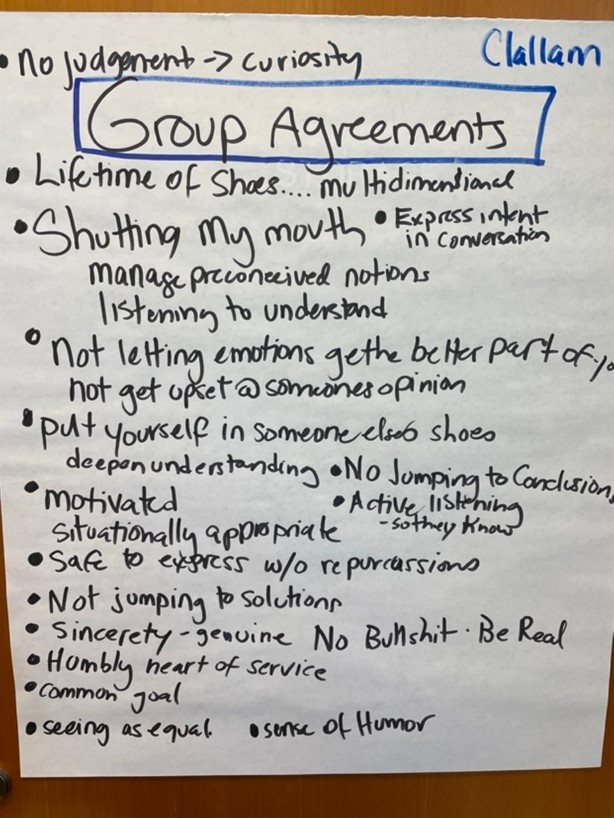
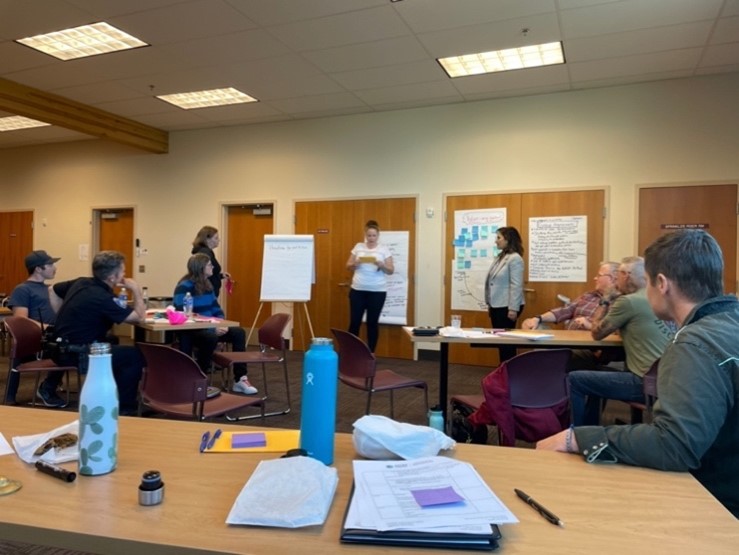
Session 2:
Developed statement and planned to talk to community members (“learning conversations”) to better understand what drug use looks like in their area.(Agenda, PPT)
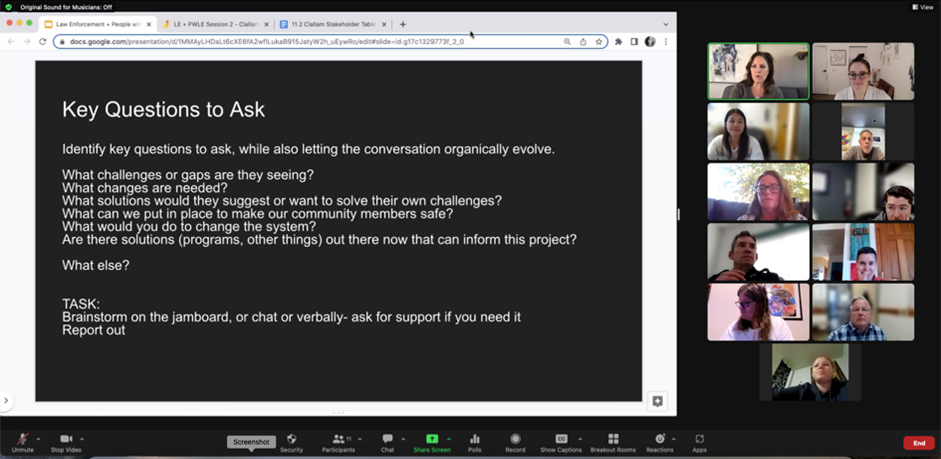
Session 3:
All three sites, including Washington State Representative Lauren Davis, were gathered for Q&A on conducting learning conversations. (Agenda, PPT)
Session 4:
Shared learning conversations and used the responses to brainstorm and rank top 3 issues/solutions to tackle. (Agenda, PPT)
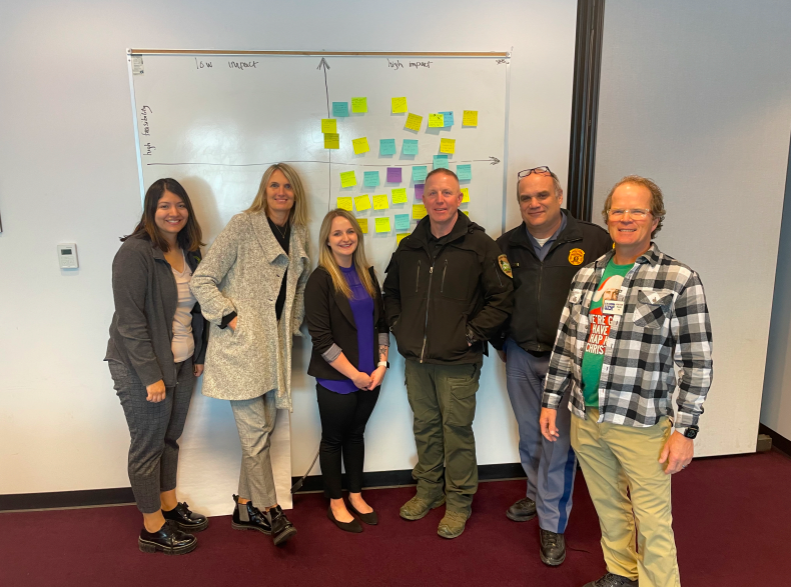
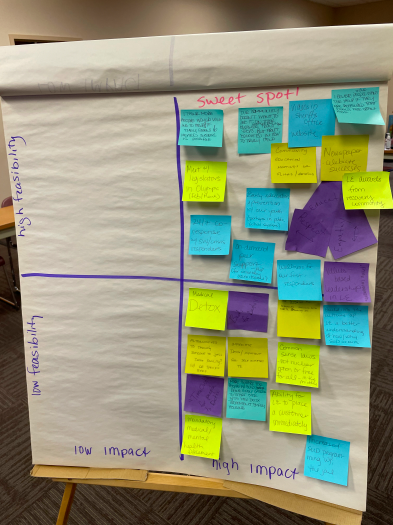
Session 5:
Brought together all sites to share their top 3 ideas with each other. (Agenda)
Session 6:
Developed pilot projects to address the top 3 issues/solutions to tackle. (Agenda, PPT)
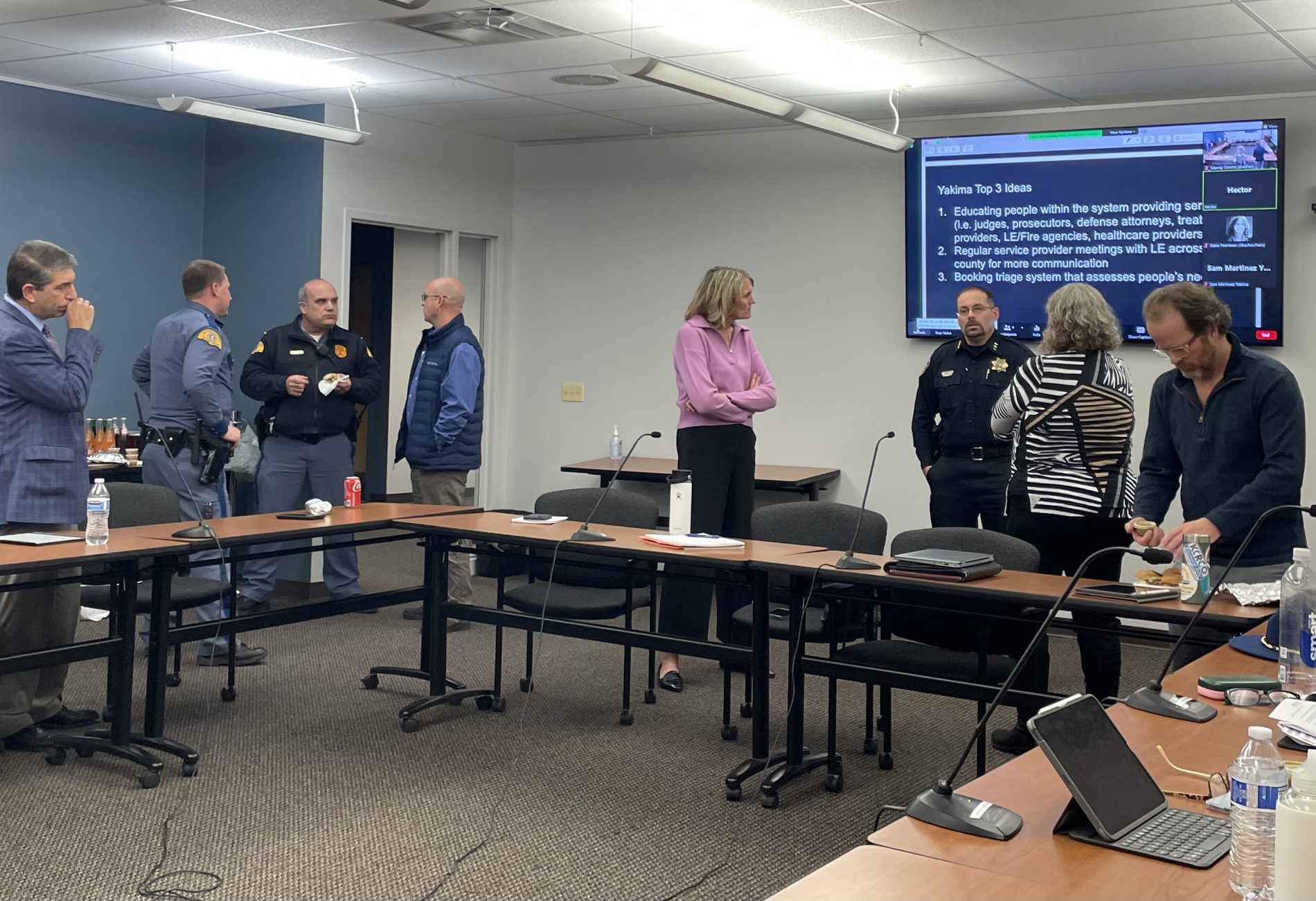
A series of 6 to 7 sessions in which diverse stakeholders (law enforcement, people with living/lived experience of drug use, service providers, etc.) came together to connect, build relationships, discuss issues in their community (Grant County, Chelan/Douglas County, Kitsap County, & Whatcom County), and cocreate pilot solutions to improve interactions between law enforcement and people who use drugs.
*LE= law enforcement, PWLE=people with living/lived experience of drug use, SP=service provider
Level Setting:
Two-hour meetings within stakeholder groups to discuss challenges and opportunities in the community in preparation to enter the codesign process. (LE Agenda, PWLE Agenda, SP Agenda)
Top 3 Challenges and Opportunities - Grant:
- Challenges
- Education (first responders and community)
- Limited services & no diversion programs
- No aftercare following critical incidences and jail release
- Opportunities
- Access to 24/7 crisis, mental health, and substance use services
- Coordinating services across networks
- Ongoing training/education for first responders and community members
Top 3 Challenges and Opportunities - Chelan/Douglas:
- Challenges
- Stigma (both towards LE and PWLE)
- No withdrawal management/detox and alternative to jail options
- Lack of mental health, substance use, and housing services
- Opportunities
- Community education/relationship building
- Collaborative network of service providers
- Diversion care and withdrawal services (may be starting soon)
Top 3 Challenges and Opportunities - Whatcom:
- Challenges
- Not enough jail beds
- Limited understanding of the law and impact of Fentanyl by political leaders and the public
- Faster and timely response during emergency/overdose
- Opportunities
- Education (LE, decision makers, public, businesses, schools, etc.)
- Narcan and CPR training for PWLE or community members
- Joint LE and community proposal for behavioral health and substance use disorder treatment and education center → “redefining jail”
Top 3 Challenges and Opportunities - Kitsap:
- Challenges
- Duplication of efforts → lack of collective impact
- No detox and wait for treatment services
- Impact of past legal involvement (stigma, employment, housing, trauma, etc.)
- Opportunities
- Coordination of efforts and services
- Prevention education
- Small community → personable, more accountability, connectedness
Session 1:
Completed introductions, group agreements, relationship building with all stakeholders. (Facilitator Agenda, Participant Agenda, Interview Sheet)
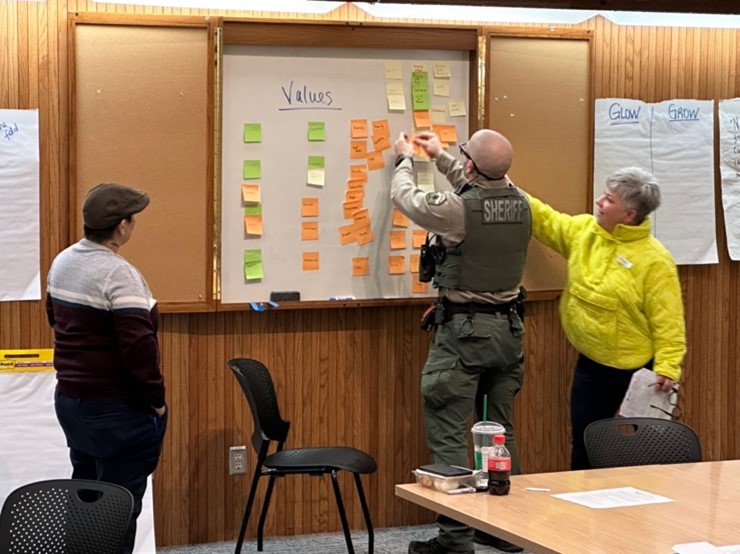
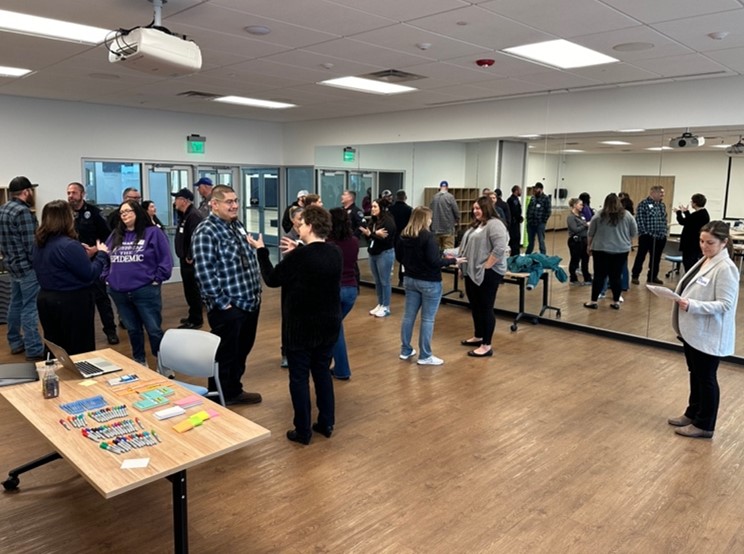
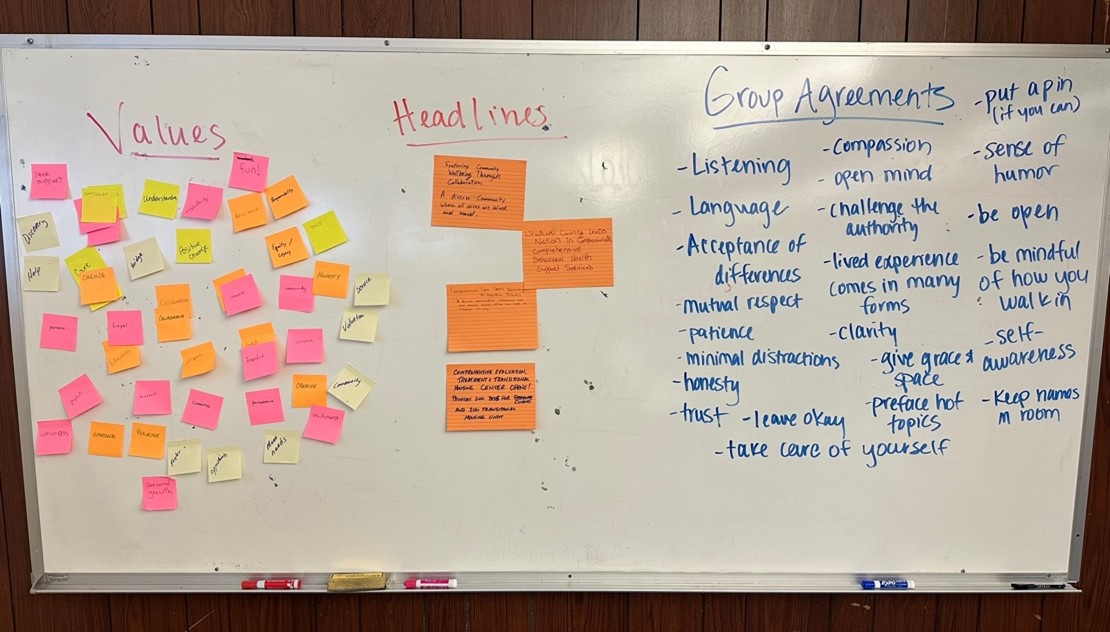
Session 2:
Developed statement and planned to talk to community members (“learning conversations”) to better understand what drug use looks like in their area. (Facilitator Agenda, Participant Agenda, Template)
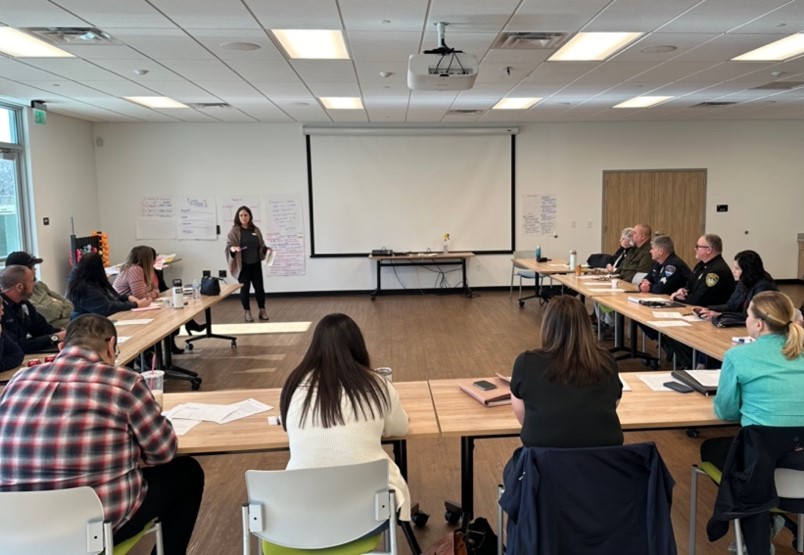
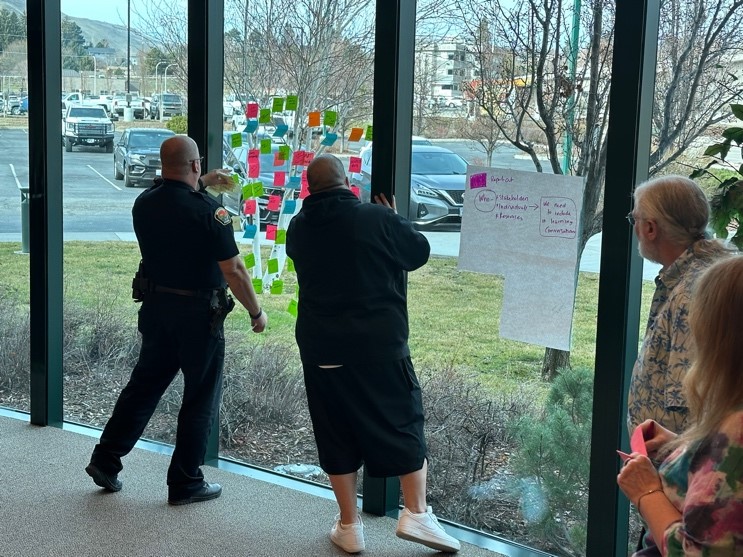
Session 3:
Shared learning conversations and used the responses to brainstorm potential prototypes and solutions. (Facilitator Agenda, Participant Agenda, Reflection Sheet)
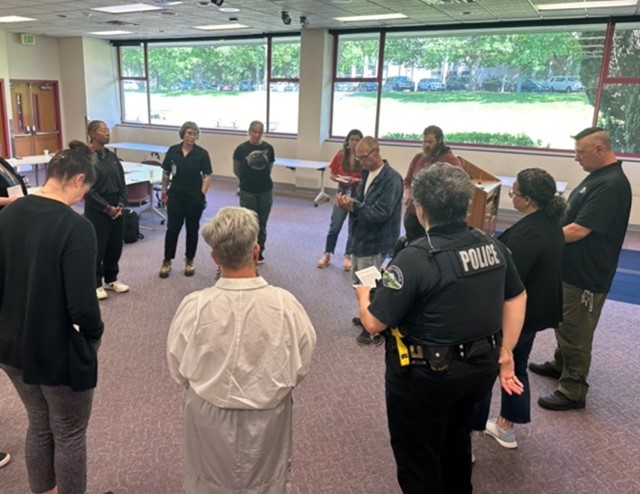
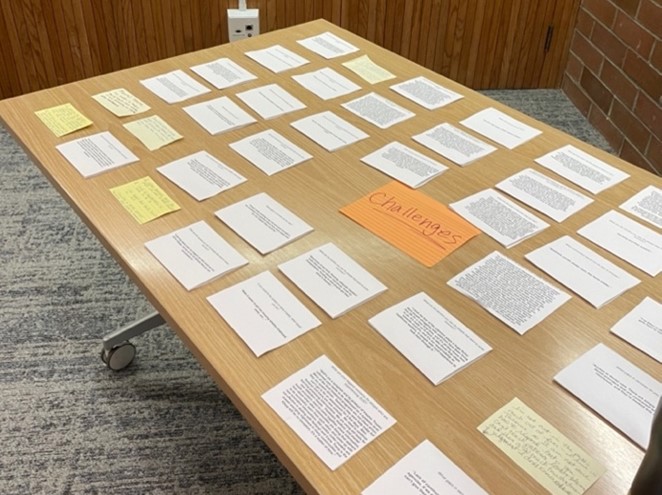
Session 4:
Shared learning conversations and used the responses to brainstorm and rank top issues/solutions to tackle. (Facilitator Agenda, Participant Agenda, Solutions Sheet)
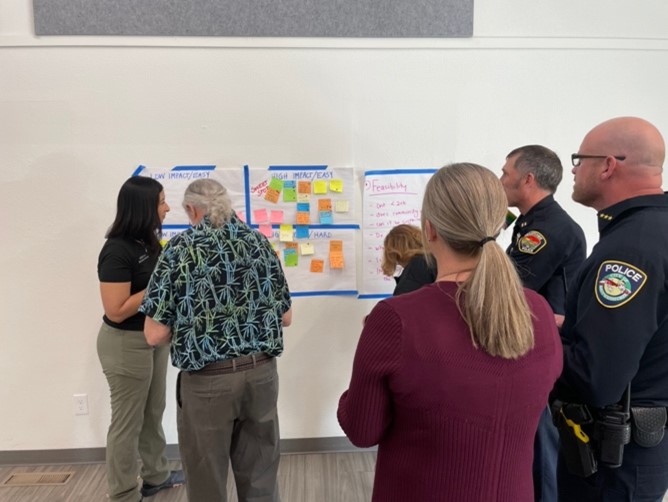
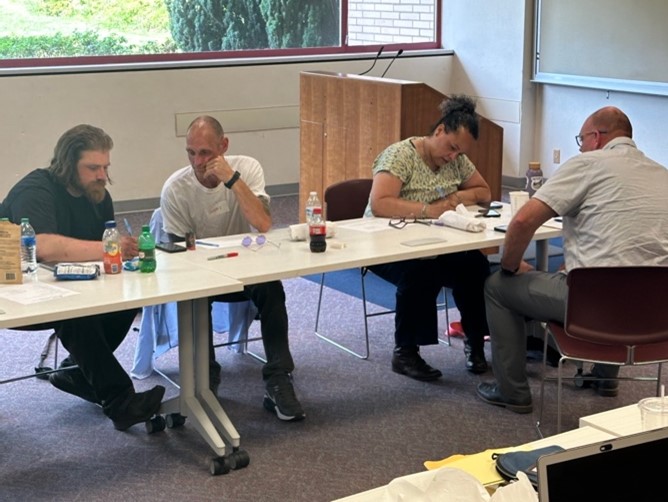
Session 5:
Developed pilot projects to address the top issues/solutions to tackle.
- Grant and Chelan/Douglas gathered for a joint session to share their top ideas with each other to promote cross learning and offer feedback. (Facilitator Agenda (Converge), Participant Agenda (Converge), Implementation Sheet, Feedback Sheet)
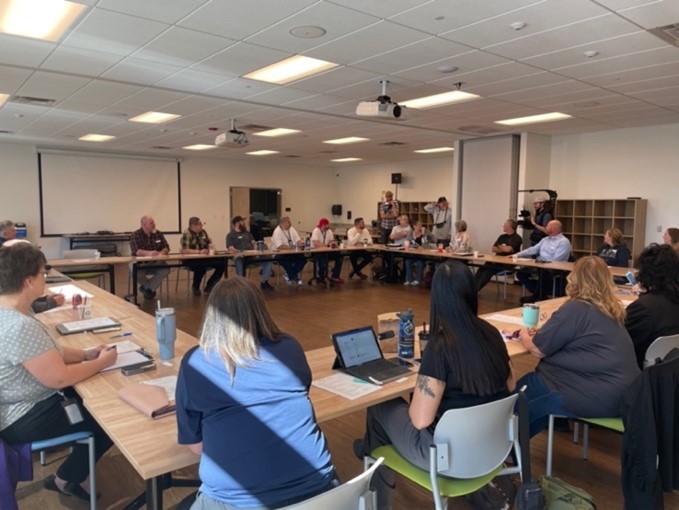
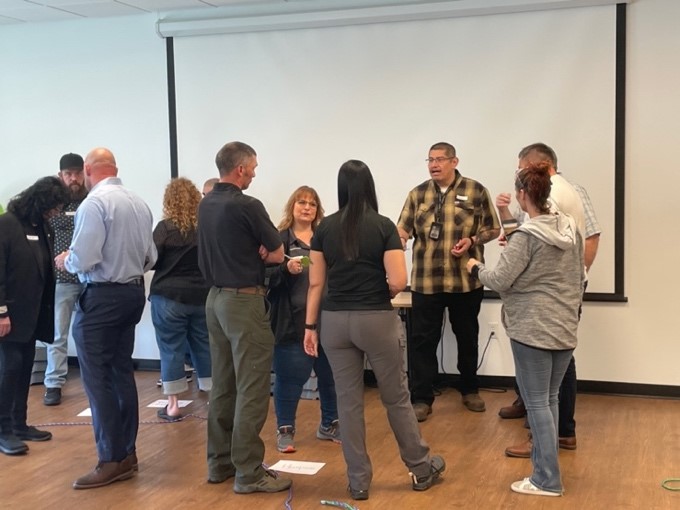
- Kitsap and Whatcom both wrapped up the feasibility matrix and continued to work on prototypes/recommendations. (Facilitator Agenda, Participant Agenda, Implementation Sheet)
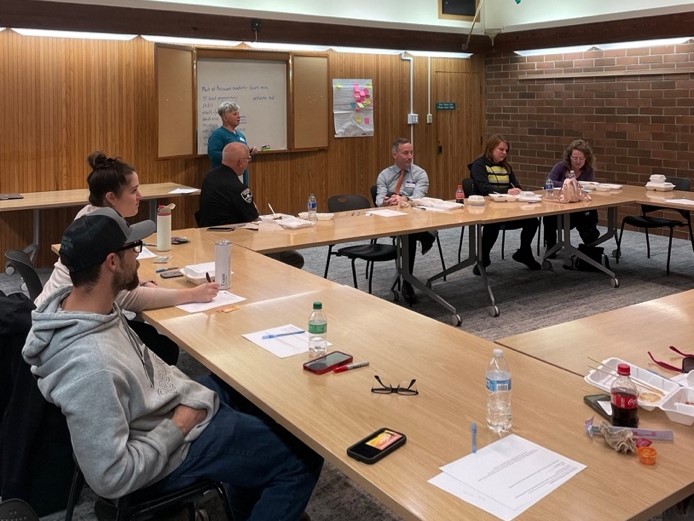
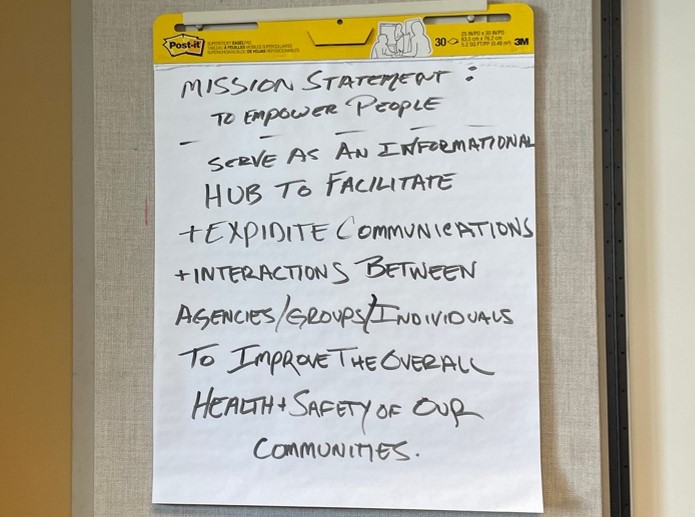
Session 6-7:
Teams will continue to build an implementation plan to identify roles and next steps. They will also have an opportunity to go experiment and implement prototypes.
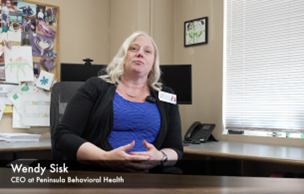
Each site developed a local solution to help improve interactions between law enforcement and people who use drugs.
Clallam: Officer Wellness Program, Education + Success Stories Video
Officer Wellness Program: A six-session program aiming to have officers recognize their own trauma and how this trauma may affect their work and personal life.
Education + Success Stories Video: A video showcasing local success stories of recovery and law enforcement success/positive interactions they have had with the community and to educate the general public about laws they may not know about.

Thurston: Letter Writing in Jails
The Letter Writing in Jails project was spearheaded by a service provider with lived experience of substance use and incarceration that provides each person booked into the Nisqually jail with a personal, heartfelt letter he wrote encouraging them to reach out for peer services and referrals to treatment.
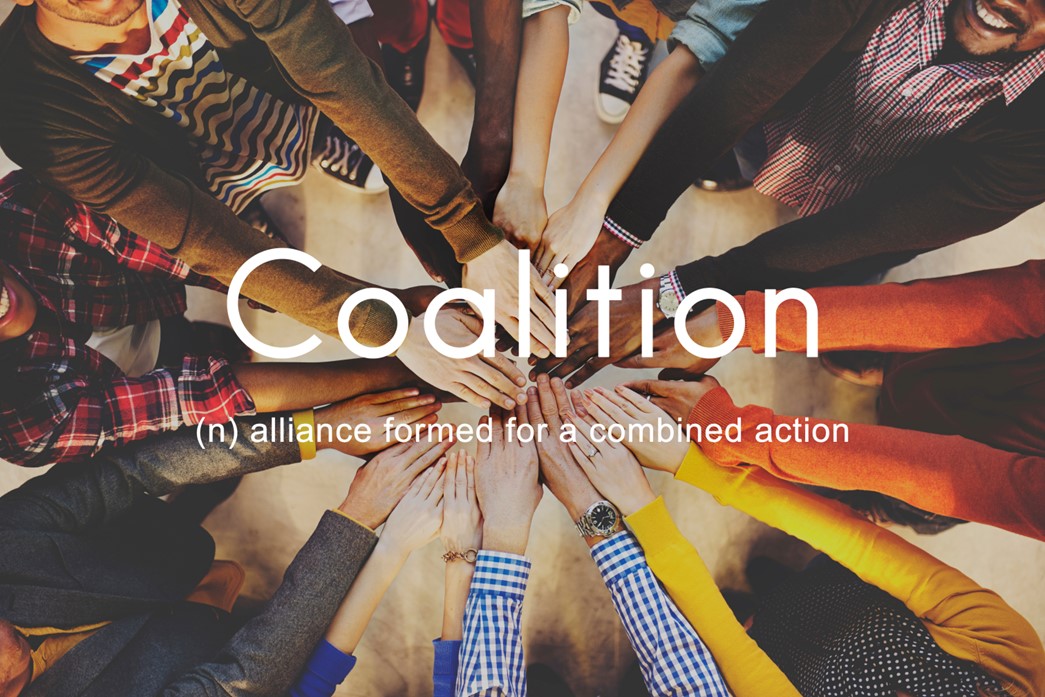
Yakima: Continuing Strengthening Community Coalition Meetings
The Yakima group decided to continue conversations and co-learning among community stakeholders and discuss how to improve wraparound services in the local jails. This effort evolved into a monthly Community Coalition Meeting that added more stakeholders (i.e. criminal defense attorney, director of jail, director of human services in Yakima County, etc.), and is continued by Yakima County Department of Human Services.
Each site developed a local solution to help improve interactions between law enforcement and people who use drugs.
Chelan/Douglas: Jail Re-Entry and Community Education Videos
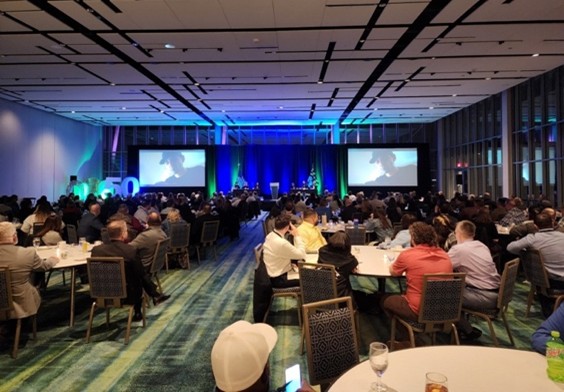
With Thriving Together NCW’s sponsorship the Chelan/Douglas team decided to create Jail Re-Entry and Community Education Videos to:
- Inspire people in active addiction to begin a dialogue of recovery and take the first steps towards it.
- Highlight local individuals with lived experience of drug use to show recovery is possible.
- Provide a sense of hope and availability of support for those incarcerated at the jail.
- Create an opportunity for DOC staff, elected officials, and community leaders to better understand the value of peer-led recovery and inspire ongoing and growing support.
They created three videos interviewing individuals on their recovery journey. The videos have since been shared with local law enforcement, service providers, policy makers, and to larger audiences at conferences.
- Video #1 - Stories of Recovery: Cruz Video
- Video #2 - Stories of Recovery: Carmen Video
- Video #3 - Stories of Recovery: Mike Video
After watching, please take a few minutes to share your thoughts in this short survey. Your feedback will help Thriving Together continue these important conversations.
To learn more about this initiative, visit Recovery Initiatives on the Thriving Together Website.
Grant: Public Forum Series
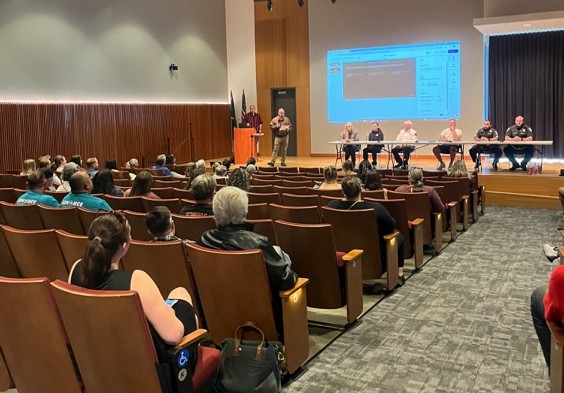
In collaboration with local Prevention Coalition, the Public Forum Series aims to
- share stories of lived experiences with community members by inviting various stakeholders as panelists (law enforcement, EMS, service provider, person with lived experiences, family members, etc.) and
- highlight services in the community surrounding substance use disorder, mental health, homelessness, etc.
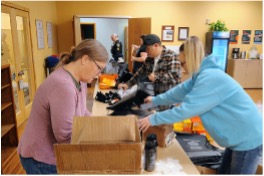
Kitsap: Water Bottle Project - Day Center Advertisement Plan After conversations on how many community members were unfamiliar with the local Day Centers, the team decided to develop a Water Bottle Project to increase awareness of available services. Volunteers from the team create care packages with custom resource water bottles and other items like socks, toiletries, etc. to distribute in the community via law enforcement and service providers.
Whatcom: Community Health Education
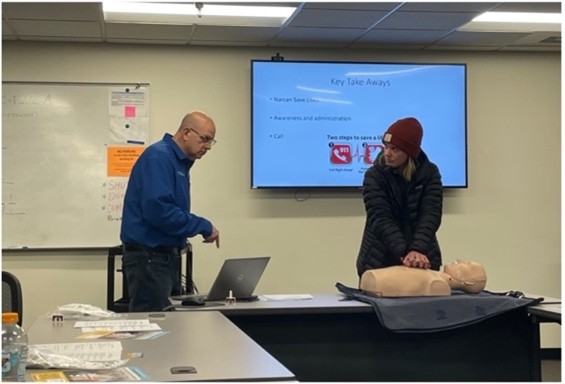
To empower and encourage community care for the unhoused community in the County, the group chose to provide free training to service providers and people at encampments on topics of first aid, wound care, CPR, and Narcan. By utilizing the Portland Street Medicine’s community health education initiative, they collaborated with Emergency Medical Services and Whatcom County Health and Community Services to create first aid packages and provide trainings to those interested.
2022-2023: Clallam, Thurston, Yakima
Individual interviews were conducted with N=32 site codesign team members and staff from the internal project team to gather feedback from the process and suggestions for the future. Data were analyzed for themes and are presented in a report.
2023-2025: Grant, Chelan/Douglas, Kitsap & Whatcom
- Regions may use existing policy codesign materials (agendas, powerpoint slides) to engage in a similar process in their own community.
- Regions can learn about and adopt the regional solutions developed in previous sites during FY23 (Clallam, Thurston, Yakima) or FY24-25 (Grant, Chelan/Douglas, Kitsap, Whatcom), tailoring parts of solutions for their own community.
- The website and materials also will be used to recruit new communities to engage in the codesign process across FY24/25.

Funding for the Community-Law Enforcement Aligning in Response to Substance use (CLEARS) project was renewed for an additional two years to conduct a similar policy codesign process in new regions around Washington state across FY26-27.
